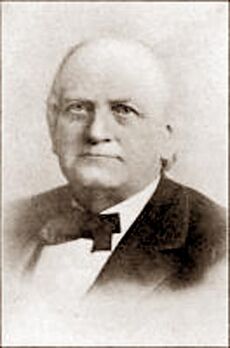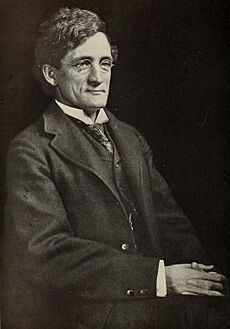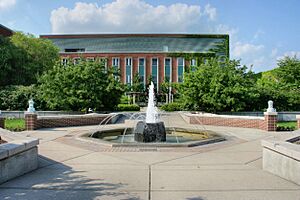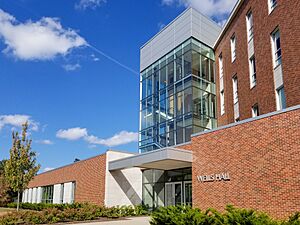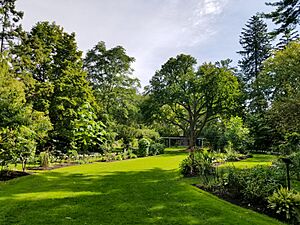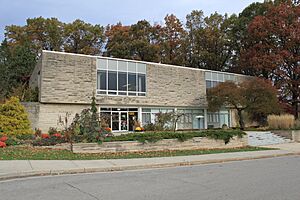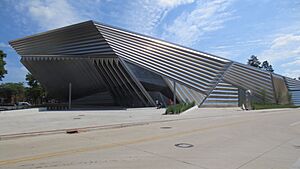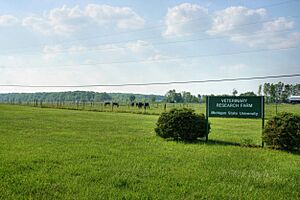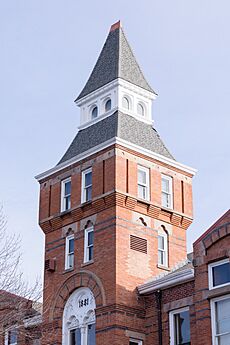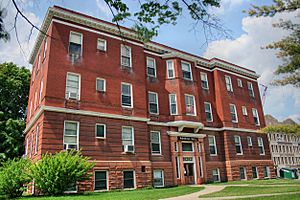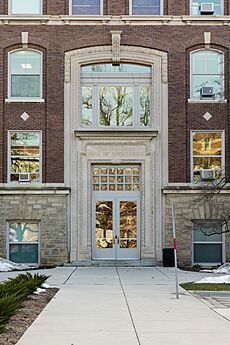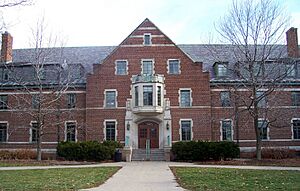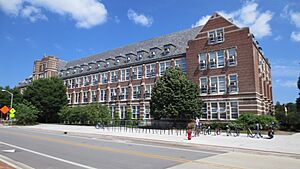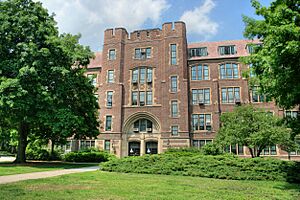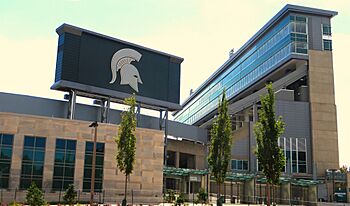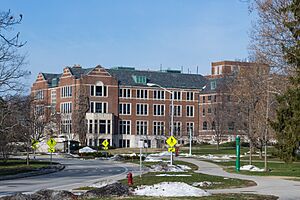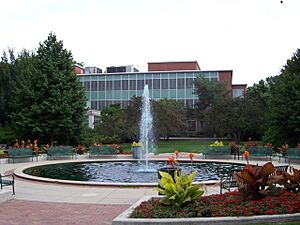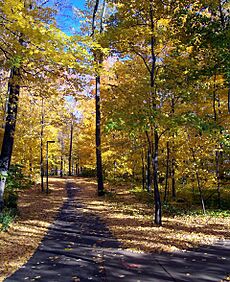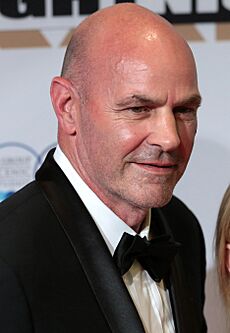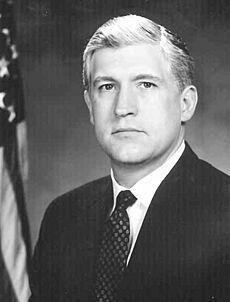Michigan State University facts for kids
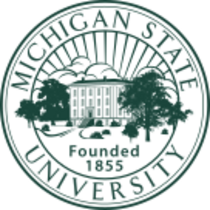 |
|
|
Former names
|
List
Agricultural College of the State of Michigan (1855–1861)
State Agricultural College (1861–1909) Michigan Agricultural College (1909–1925) Michigan State College of Agriculture and Applied Science (1925–1955) Michigan State University of Agriculture and Applied Science (1955–1964) |
|---|---|
| Motto |
|
| Type | Public land-grant research university |
| Established | February 12, 1855 |
| Accreditation | HLC |
|
Academic affiliations
|
|
| Endowment | $4.4 billion (2024) |
| President | Kevin Guskiewicz |
|
Academic staff
|
5,703 (2024) |
|
Administrative staff
|
7,365 (2024) |
| Students | 52,089 (fall 2024) |
| Undergraduates | 41,234 (fall 2024) |
| Postgraduates | 10,855 (fall 2024) |
| Location |
,
,
United States
42°43′30″N 84°28′48″W / 42.72500°N 84.48000°W |
| Campus | Small city, 5,300 acres (21 km2) |
| Colors | Green and white |
| Nickname | Spartans |
|
Sporting affiliations
|
NCAA Division I FBS – Big Ten |
| Mascot | Sparty |
 |
|
Michigan State University (also known as Michigan State or MSU) is a large public university in East Lansing, Michigan, USA. It started in 1855 as the first agricultural college in the country. It became a special "land-grant" university in 1863, which meant it received land from the government to help teach practical subjects.
MSU was one of the first colleges to allow both male and female students in 1870. Today, it has many buildings and programs across Michigan. Over 634,000 people have graduated from MSU.
Michigan State is known for its strong research programs. It has special places like the Facility for Rare Isotope Beams (FRIB), the W. J. Beal Botanical Garden, and the Abrams Planetarium. It also has one of the biggest student housing systems in the country.
The university offers many different subjects, from law and business to nursing and veterinary medicine. It even helped start new fields of study like music therapy and packaging. Many famous people have studied or worked at MSU, including Nobel Prize winners and Pulitzer Prize winners. The university's sports teams, called the Michigan State Spartans, compete in the Big Ten Conference and have won many national championships.
Contents
Discovering MSU's Past
In the mid-1800s, people in Michigan wanted a college to teach about farming. So, in 1855, the Agricultural College of the State of Michigan was created. It was the very first college of its kind in the United States.
John Clough Holmes was a key person who convinced the state to create the college. On February 12, 1855, the governor signed the bill to make it official. Classes began on May 13, 1857, with just three buildings, five teachers, and 63 male students.
The first president, Joseph R. Williams, wanted the college to teach more than just farming. He believed in a well-rounded education. However, some people thought the college was straying too far from its farming roots. Williams eventually left, and the college faced financial trouble.
In 1861, the college was reorganized and changed its name to State Agricultural College. It also got the power to offer master's degrees. A new group, the State Board of Agriculture, took over running the school.
In 1862, President Abraham Lincoln signed the Morrill Land-Grant Acts. This law helped create similar colleges across the country by providing federal money. Michigan State became the first "land-grant" college in 1863, which saved it from closing.
Even though the college was in a quiet location, it became well-known. Many graduates went on to lead or teach at other colleges. In 1870, women were first allowed to attend, taking the same science classes as men. Later, in 1896, a "Women Course" was created, focusing on home economics and other subjects.
The first African American student, William O. Thompson, enrolled in 1899. A few years later, Myrtle Craig Mowbray became the first African American woman student. The college then changed its name to Michigan Agricultural College.
By 1925, the college had grown a lot and offered many more subjects. It changed its name again to Michigan State College of Agriculture and Applied Science, or "Michigan State" for short.
After World War II, President John A. Hannah led a huge expansion of the university. With help from the G.I. Bill, which helped veterans go to college, enrollment grew from 15,000 in 1950 to 38,000 in 1965.
In 1955, during its 100th year, the school officially became Michigan State University of Agriculture and Applied Science. It was recognized as a major research university. In 1964, its governing body became the Michigan State University Board of Trustees.
In 2005, President Lou Anna Simon set a goal for MSU to become a global leader for land-grant universities.
Exploring the Campus
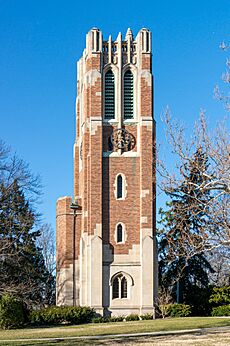
MSU's large campus is in East Lansing, Michigan, right by the Red Cedar River. It started with just three buildings in 1856. Today, the main campus covers about 5,300 acres, with 2,000 acres developed. There are 563 buildings, including those for classes, farming, housing, food, and sports. The university also owns other properties across Michigan.
In 2017, MSU started a big solar project in five parking lots. These "solar carports" cover 5,000 parking spaces and produce enough energy to power about 1,800 homes. It's the largest solar carport system in North America!
Some of MSU's land is also in nearby cities like Lansing.
North Campus: Historic Charm
The oldest part of campus is north of the Red Cedar River. It has beautiful old buildings, lots of trees, and winding roads. Key landmarks include Cowles House, the president's home, and Beaumont Tower, a clock tower that marks the spot of the first classroom building.
You can also find the W. J. Beal Botanical Garden here, which is a lovely place to visit. "The Rock" is another popular spot where students often paint messages. The MSU Museum, one of the oldest in the Midwest, is also on this side of campus. The Eli and Edythe Broad Art Museum, with its unique design, opened in 2012 and shows off MSU's art collection.
South Campus: Modern Spaces
South of the river, the campus has more modern buildings and straighter roads. There are also many parking lots, though plans are in place to replace some with parking garages and green spaces in the future. A bronze statue of The Spartan, MSU's mascot, stands at a main intersection here.
Important buildings on the South Campus include the National Superconducting Cyclotron Laboratory, the College of Law, and the Facility for Rare Isotope Beams (FRIB), which is a major research center.
This area also has the Michigan State University Horticulture Gardens and the 4-H Children's Garden. Beyond these gardens are thousands of acres of university farmland, where MSU's agricultural research and teaching farms are located.
Kellogg Hotel and Conference Center
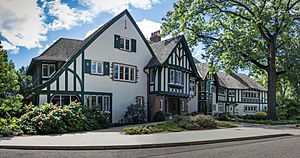
The Kellogg Hotel and Conference Center is both a hotel and a place for business meetings. It's on the northwest side of campus. It's also a "learning lab" for students studying hospitality business.
MSU's Other Locations
MSU has a presence in downtown Detroit, with programs like the Apple Developer Academy. In 2023, MSU bought a part of Detroit's famous Fisher Building to open a startup incubator.
The College of Human Medicine has smaller campuses in several Michigan cities, partnering with local hospitals. These include Grand Rapids, Flint, Midland, Traverse City, Marquette, Southfield, and Detroit.
Becoming a Spartan: Admissions
Michigan State uses a rolling admissions system, meaning they review applications as they come in. For students starting in fall 2024, MSU received over 62,000 applications and accepted about 52,000. Of those accepted, about 9,600 students chose to enroll.
MSU started offering "test-optional" admissions in 2021, meaning students don't have to submit SAT or ACT scores if they don't want to. For students who did submit scores in 2023, the middle 50% of SAT scores were between 1110 and 1320, and ACT scores were between 24 and 30.
Learning at MSU: Academics
MSU is known for many of its academic programs. For example, its programs in elementary and secondary teacher education have been ranked number one in the country for many years. The supply chain management program is also ranked first nationally.
The Eli Broad College of Business is highly rated, especially for its supply chain management and accounting programs. The College of Communication Arts and Sciences was the first of its kind in the U.S. and has produced many award-winning journalists and filmmakers.
Collections and Museums
The Eli and Edythe Broad Art Museum is MSU's museum for modern art. The MSU Museum is the university's oldest museum, founded in 1857. It has collections on many topics, from animals to history.
The Michigan State University Libraries system is one of the largest in North America, with millions of books and other materials.
Research and Discoveries
MSU has a long history of important research. In 1877, a botany professor named William J. Beal created the first hybrid corn, which helped farmers grow more food. In the 1930s, an MSU professor improved how milk is homogenized. In the 1960s, MSU scientists developed cisplatin, an important drug used to fight cancer.
Today, MSU continues its research with facilities like the National Superconducting Cyclotron Laboratory, which studies tiny particles. The Facility for Rare Isotope Beams (FRIB), a huge $730 million facility, opened in 2022. It brings top scientists from around the world to study nuclear science.
MSU also works with the University of Michigan and Wayne State University in the University Research Corridor. This group helps Michigan's economy by speeding up new technology and creating jobs.
University Funding
MSU's private fund, called an endowment, started in 1916. It grew a lot in the 2000s. As of June 30, 2021, MSU's endowment was worth $4.4 billion. This money helps support the university's programs and research for a long time.
MSU's Colleges and Programs
MSU offers over 200 academic programs through its 17 colleges.
Special Living-Learning Colleges
MSU has special "residential colleges" where students live and learn together in a smaller community.
- James Madison College, started in 1967, focuses on social sciences and has small classes. Students often study abroad or do internships.
- Lyman Briggs College, also started in 1967, teaches math and science by connecting them to history and philosophy. Many students here want to work in medicine.
- The newest is the Residential College in Arts & Humanities (RCAH), founded in 2005. It offers a unique program in liberal arts and visual/performing arts.
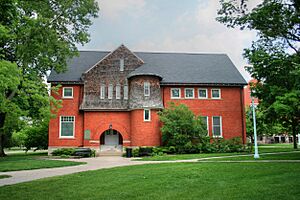
Professional Schools
MSU has several professional schools:
- The Michigan State University College of Law moved to East Lansing in 1995. It offers law degrees and publishes several law journals.
- The Eli Broad College of Business has programs in accounting, finance, marketing, and hospitality. Its supply chain management program is ranked number one nationally.
- The Michigan State University College of Nursing trains nurses and offers various nursing degrees.
- The Michigan State University College of Osteopathic Medicine was the first public college of osteopathic medicine in the world. Many of its graduates stay in Michigan to practice.
- The Michigan State University College of Human Medicine offers medical degrees and has campuses in several Michigan cities, partnering with local hospitals.
- The Michigan State University College of Veterinary Medicine has been training veterinarians since 1910 and is highly ranked.
Other Academic Areas
MSU's music program grew so much that it became its own college, the MSU College of Music, in 2007. The College of Education is also highly ranked, especially for its teacher education programs.
The Michigan State University Honors College offers special programs for MSU's brightest undergraduate students. The College of Engineering has a program called CoRe (Cornerstone Engineering and Residential Experience) that gives new students hands-on experience and opportunities to study engineering abroad.
MSU's original focus on agriculture continues today in the College of Agriculture & Natural Resources.
Spartan Sports: Athletics
Michigan State has 12 varsity sports for men and 13 for women. All teams are called the Spartans, and their mascot is Sparty. MSU competes in the Big Ten Conference.
Football Fun
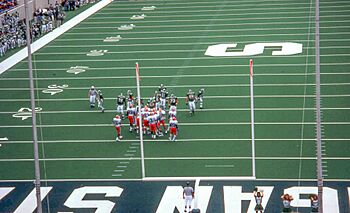
Football has a long history at Michigan State, starting as a club in 1884. The Spartans have won the Rose Bowl four times (1954, 1956, 1988, and 2014) and national championships in 1951, 1952, 1955, 1957, 1965, and 1966.
Basketball Excitement
MSU's men's basketball team has won the National Championship twice: in 1979 and 2000. They play their games at the Jack Breslin Student Events Center.
Ice Hockey Thrills
The men's ice hockey team started in 1924 and has won national titles in 1966, 1986, and 2007. They play at Munn Ice Arena. The rivalry between the Spartans and the Michigan Wolverines is very strong. In 2001, a world record crowd of 74,554 people watched a hockey game between the two teams at Spartan Stadium.
Cross Country Success
Michigan State's men's cross country team has won many titles, including 14 Big Ten championships and 8 NCAA championships.
Wrestling Power
MSU Spartan Wrestling won their only team NCAA Championship in 1967. They have had many Big Ten champions and All-Americans.
Life as an MSU Student
East Lansing is a true "college town," with many young people. MSU has the largest residence hall system in the United States, with about 16,000 students living on campus. Many other students live in apartments or houses near campus.
In 2014, there were about 50,085 students at MSU, coming from all 50 U.S. states and 130 countries.
International Connections
MSU welcomes many international students. In fall 2019, over 5,600 international students were enrolled, mostly from China, India, and South Korea. MSU also has a large study abroad program, with students traveling to over 60 countries.
In 2021, MSU helped evacuate over 70 staff, scholars, and their families from Afghanistan during a difficult time, showing its commitment to its international community.
Student Groups and Activities
The Associated Students of Michigan State University (ASMSU) is the student government. They offer services like free blue books for exams, low-cost printing, and help for student organizations.
There are over 800 student organizations at MSU, covering many interests. The Eli Broad College of Business alone has 27 student groups.
Making a Difference: Activism
Activists have played an important role in MSU's history. Students have protested for various causes, from creating co-ed dorms to encouraging the university to use clean energy. After a difficult event on campus in February 2023, students organized peaceful protests to support gun control laws, which led to new laws being passed in Michigan.
Caring for the Planet: Sustainability
The MSU Office of Sustainability works to make the campus more environmentally friendly. MSU uses less electricity per square foot than other Big Ten universities. The university aims to reduce energy use, greenhouse gas emissions, and landfill waste.
All new buildings at MSU are designed to meet high environmental standards, like LEED certification. In 2009, a new recycling center opened to help the university recycle more. The Student Organic Farm is a student-run farm that teaches organic farming and provides fresh food to the community.
Campus News and Media
MSU has many ways for students to get news and information:
- The State News is the student-run newspaper, available online and around campus.
- The Red Cedar Log is the campus yearbook.
- Red Cedar Review is a literary journal run by undergraduate students.
- Ing Magazine and VIM Magazine are student-run magazines about lifestyle and fashion.
MSU also has electronic media:
- WKAR-TV is MSU's Public Broadcasting Service (PBS) station, the second-oldest educational TV station in the U.S.
- MSU has three radio stations: WKAR-AM (talk radio), WKAR-FM (classical music), and WDBM (student-run, playing alternative music and covering sports and news).
Campus Safety and Support
While violent crime is rare on campus, the university has faced challenges. In February 2023, a shooting occurred on campus. In response, the university and community came together to support each other, and classes were canceled for a week to allow time for healing and reflection. The university continues to focus on safety and well-being for all students.
Managing Investments
The Michigan State University Investment Office manages the university's money, called its endowment. This office works to help the university's funds grow over time while being careful with risks. It was created in 2016 to handle all investment activities in one place.
Famous Spartans: People of MSU
MSU has about 5,703 teachers and 7,365 staff members.

Notable Faculty
Important leaders in MSU's early history include John C. Holmes, the founder, and presidents Joseph R. Williams and Theophilus C. Abbot, who helped shape the college's early education. Botany professor William J. Beal was a pioneer in plant genetics. Liberty Hyde Bailey, an alumnus and professor, is known as the "Father of American Horticulture."
Famous Alumni
As of fall 2018, there were about 634,300 living MSU graduates around the world. Many have become famous in different fields:
- Politics and Public Service: Current Michigan Governor Gretchen Whitmer, former U.S. Senators Debbie Stabenow and Spencer Abraham, and former Prime Minister of South Korea Lee Wan-koo.
- Business and Philanthropy: Billionaires Tom Gores, Andrew Beal, and Eli Broad, and Quicken Loans founder Dan Gilbert.
- Arts and Entertainment: Actors like James Caan and Robert Urich, film directors Michael Cimino and Sam Raimi, and composer Clare Fischer.
- Journalism: NBC reporter Chris Hansen and ESPN sportscaster Jemele Hill.
- Sports: Basketball legend Earvin "Magic" Johnson, baseball Hall of Famer Robin Roberts, and hockey stars Duncan Keith and Ryan Miller.
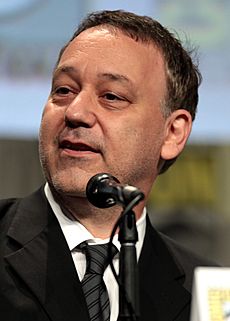


Other notable alumni include Russell Kirk, who influenced American conservative thought, and Verghese Kurien, known as the "Father of the White Revolution" in India for his work in agriculture. Tyler Oakley, a popular YouTube personality, also graduated from MSU.
See also
 In Spanish: Universidad Estatal de Míchigan para niños
In Spanish: Universidad Estatal de Míchigan para niños
- List of land-grant universities
- List of colleges and universities in Michigan
- Education in Michigan
- Michigan State University Spartan Marching Band
 | Leon Lynch |
 | Milton P. Webster |
 | Ferdinand Smith |


